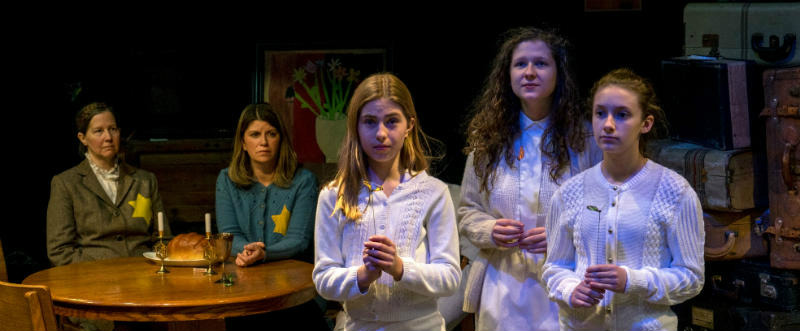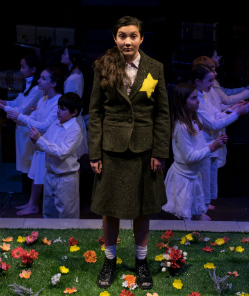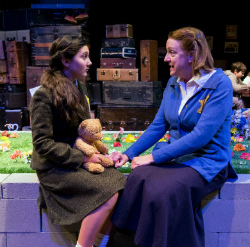Recap: If I Never Saw Another Butterfly

01 Mar 2018 |
From February 9-18, 2018, the DM Young Artists’ Theatre and the Jewish Federation of Greater Des Moines welcomed the community to see If I Never Saw Another Butterfly, a play by Celeste Raspanti.
Over 15,000 Jewish children passed through Terezin, and only about a hundred were still alive when Terezin was liberated at the end of the war. One of the survivors, Raja, having lived through it all, teaching the children when there was nothing to teach with, helping to give them hope when there was little enough reason for hope, creating a little world of laughter, of flowers and butterflies behind the barbed wire, tells the true story of the children. It’s her play and it’s theirs. There were no butterflies at Terezin, of course, but for the children, butterflies became a symbol of defiance, making it possible for them to live on and play happily while waiting to be transported.
About the Production
 It was a great challenge for the Des Moines Young Artists’ Theatre to stage a production of Sr. Celeste Raspanti’s Holocaust-themed play. A large cast of actors needed to be engaged. Through auditions, the theater’s artistic director and his assistants found them. The cast numbered twenty-six, and most of them were teens. The play required many rehearsals and a total of nine performances over a two week period. Very demanding, especially for busy teens. But most of all, the hour-and-a-half play was emotionally demanding of the young cast. They were up to the task.
It was a great challenge for the Des Moines Young Artists’ Theatre to stage a production of Sr. Celeste Raspanti’s Holocaust-themed play. A large cast of actors needed to be engaged. Through auditions, the theater’s artistic director and his assistants found them. The cast numbered twenty-six, and most of them were teens. The play required many rehearsals and a total of nine performances over a two week period. Very demanding, especially for busy teens. But most of all, the hour-and-a-half play was emotionally demanding of the young cast. They were up to the task.
The play’s narrative incorporates the poem “The Butterfly,” which was written by twenty-one-year-old Pavel Friedmann in 1942 while in Terezin (Theresienstadt) concentration camp. The play itself revolves around a real-life survivor of Terezin, a Raja Englanderova, whose character is portrayed as both a youth and in her later years, reflecting back on the circumstances of life and death in the camp. The fate of many of the prisoners was that of Auschwitz. There, sadly and tragically, they met their end. But despite everything, this is a play of hopefulness — the hopefulness children brought with them into the concentration camp, and the hopefulness and comfort the children and the adults who cared for them in the camp gave to others.

After one of the Sunday matinees, there was a discussion about the play involving the artistic director, several cast members, Bev Ellis (who was born in Europe to parents who survived the Holocaust) and Rabbi Emily Barton, who had viewed one of the camps. After a previous performance, Mr. David Wolnerman, a survivor of Auschwitz, spoke with the cast.
In real life, Friedel Dicker-Brandeis, a prisoner of Terezin who took it upon herself to tutor the children, encouraged them to use their imagination and draw creatively of a hopeful future. Although she was eventually transported to Auschwitz, she made sure to pass along the drawings so that they may endure. Some of the drawings by the children of Terezin may be viewed online.
About the Artists
DM Young Artists’ Theatre is a nonprofit organization committed to:
- Introducing students and their families to the transformative power of live theatre and the arts
- Training young performers in all areas of theatre: singing, acting, dancing, writing, design, directing, and stage management
- Nurturing the next generation of artists to be free-thinking, open-minded, risk-taking artists who use their awareness of their community, society, and world to create thought-provoking and challenging works of art to promote social change.
